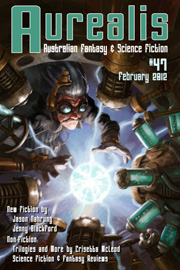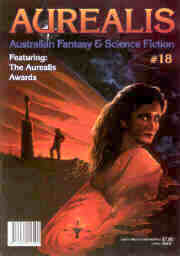Aurealis #47
$3.99
From the Cloud – Dirk Strasser
The Sacrifice – Jenny Blackford
Breaking the Wire – Jason Nahrung
Trilogies and More – Crisetta MacLeod
Reviews
Carissa's Weblog – Carissa Thorp
What do you think?
Next issue
Credits
I was asked an interesting question during an interview on the ABC Radio National Book Show recently. The interviewer wanted to know whether the Aurealis readership was more tech-savvy than the general reading public. I think the implication behind the question was whether SF readers were more open to epublications than other types of readers. And the assumption behind this question I feel was that it was fine for an SF magazine like Aurealis to become an epublication, but none of the other magazines could afford to do this because they would risk losing their less tech-savvy readers.
Firstly, is it true that SF readers are more tech-savvy than the average reader? Maybe. I haven't seen any studies on this, but anecdotal evidence suggests they might be. Of course, the question we really should ask here is what 'tech-savvy' actually mean? Does it mean higher computer use? Does it mean familiarity with a wider range of software? Does it mean programming skills? Does it mean high level use of devices like mobile phones and satellite navigators?
I'm not sure if the tech-savvy question gets us very far. It would be more valuable to ask the question: do SF readers have greater usage of eReaders than any other category of reader? If so, is it natural that we're leading the way in epublications? My initial inclination is to say that the 'tech level' required to read epublications is so low that even if SF readers were more tech-savvy than general readers, it shouldn't mean that there is greater eReader use among SF readers. Operating an eReader doesn't take a huge amount of technical skill. Kindles, Kobos and tablets like iPads are designed to be un-computer like in a lot of ways. They are generally deliberately book-like and able to be used by even the greatest techno-phobes.
So what do the statistics say?
A recent study by the Book Industry Study Group shows that the following three categories of fiction by far dominate all epublication downloads: literary fiction, romance fiction and SF. Each has over 20% share of all e-book purchases—which, in each case, is a much higher share than of print book purchases. Romance fiction outstrips SF. So, are romance readers more tech-savvy than SF readers?
There’s not a lot of technology in the issue of Aurealis. It features an exhilarating voyage into ancient Greek mythology by Jenny Blackford, some unnerving Australian outback horror by Jason Nahrung, and a thought-provoking article from Crisetta MacLeod on why one book is never enough in fantasy.
All the best from the cloud.




